Simple Tips to Help Keep Your Animals Cool in the Heat of Summer
If you are looking for tips on how to help keep your animals cool in hot weather I have some help for you today. Get tips on how to keep your goats and other livestock cool in the hot summer months. A crucial thing to learn for how to raise dairy goats in the hot summer months.
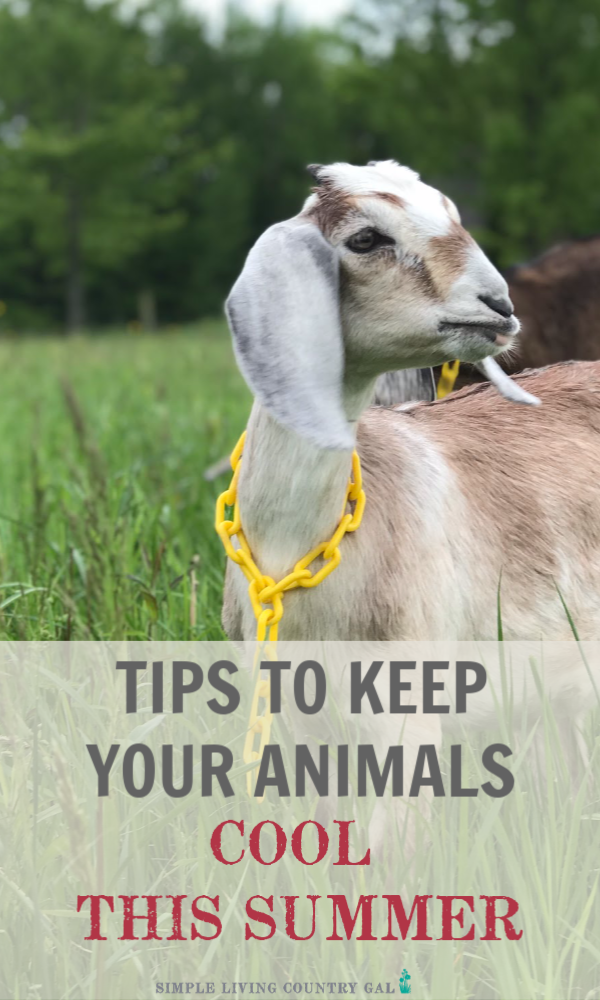
Oh, my it has been hot up here in the hills. When you wake up at 6 AM in Northwestern PA to temperatures already in the mid 70’s oh and let’s not forget to add in a little humidity that you can literally cut with a knife, then you know you are pretty much guaranteed a hot day ahead.
I have learned over the years how to keep our family here cool without running up the electric bill, but my poor animals needed help now as well. These tips will help you to keep animals cool in hot weather.
Heat can kill if we are not careful, especially in the southern states so it is important to know what you should and should not do with your animals when you want to cool them down.
Here is a tip. Slow is always the best speed to use whenever you are introducing anything new to your animals. Even with a cool down, do things slowly so you help your animals adjust at a more comfortable speed keeping the stress levels low.
How To Keep Animals Cool In Hot Weather
This list will cover the animals we have cared for over the years. I hope you can use it as a starting point for your own homestead and animals.
How to Keep Pigs Cool
Oh, my poor pig.
She is always warm, even on a cool day, so when it’s hot, we do our best to keep her cool in the summer heat. Since pigs to not have sweat glands, that means they are unable to sweat and release internal heat. Pigs also have smaller lungs limiting their ability to pant. This makes pigs much more prone to heat stress.
What is heat stress?
Heat stress is a form of hypothermia, meaning an animal’s body cannot regulate its internal temperature in a normal range. Since our animals cannot tell us when they are hot it is important to know the signs of all your animals so you can quickly catch and deal with any health issues before they get out of hand.
Since pigs cannot remove excess heat naturally, they will look for other ways to cool down. This is why pigs love to roll in the mud. Having a nice layer of cool mud helps cool them down and protects them from sunburn.
Can pigs get sunburned?
Yes, pigs, especially light-colored pigs such as a Yorkshire, can get sunburned pretty quickly too. No matter what type of pig you have. you will want to be sure there is always shade they can get to so they are not in the sun all day long.
Since we prefer to keep our pigs inside of the barn, that means we do not need to worry about direct sunlight, but our barn still gets pretty hot. To help, we like to run fans up high throughout our barn to keep the airflow moving. We will also have a smaller fan directly blowing on our pigs at all times. This really helps them to cope better with the heat.
We also keep our pigs in the coolest section of the barn that gets the least amount of sun. Another bonus of housing our pigs in the barn means they are on concrete which is nice and cool for them to lie on in the hot summer.
Access to fresh and clean water is essential for pigs as it helps to encourage plenty of drinking. If you notice your animals are not drinking as much water as they should, you may want to clean out their water dish or water system.
Stagnant water may be the reason your pigs are not drinking, so make a goal to change out the water every day or at least a few times a week to always keep things cool and fresh.
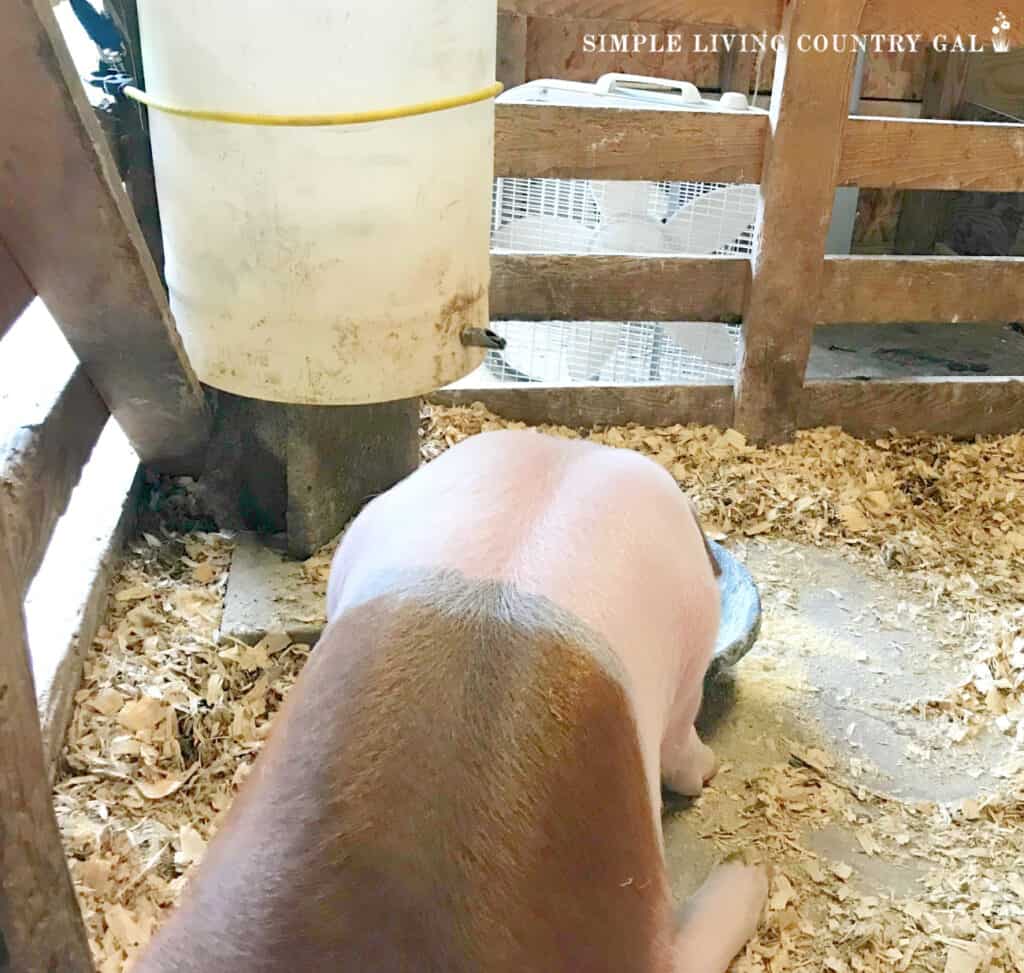
To make sure she is also eating enough, we prefer to feed her more often and in smaller amounts.
Too much food on a super hot day is not something a pig enjoys, so by giving smaller portions of feed more often, a pig will continue to gain weight all summer long. You may want to opt for a continuous feeder. This allows your pigs to eat whenever they feel the need. If you choose this way of feeding, it is important to monitor the level of feed inside daily to be sure they are eating enough.
Continuous feeders come in single or double. A pig will use its snout to lift the hinged lid giving them access to the feed inside. Gravity keeps feeding always in the troth. No, you do not need to train your pigs to use the feeder. Pigs are very smart and will quickly smell the food and use their snouts to find it.
Each evening we like to take our pigs out for nice long walks in the cool grass. We will even include a little playtime in the water with a spray down from the hose.
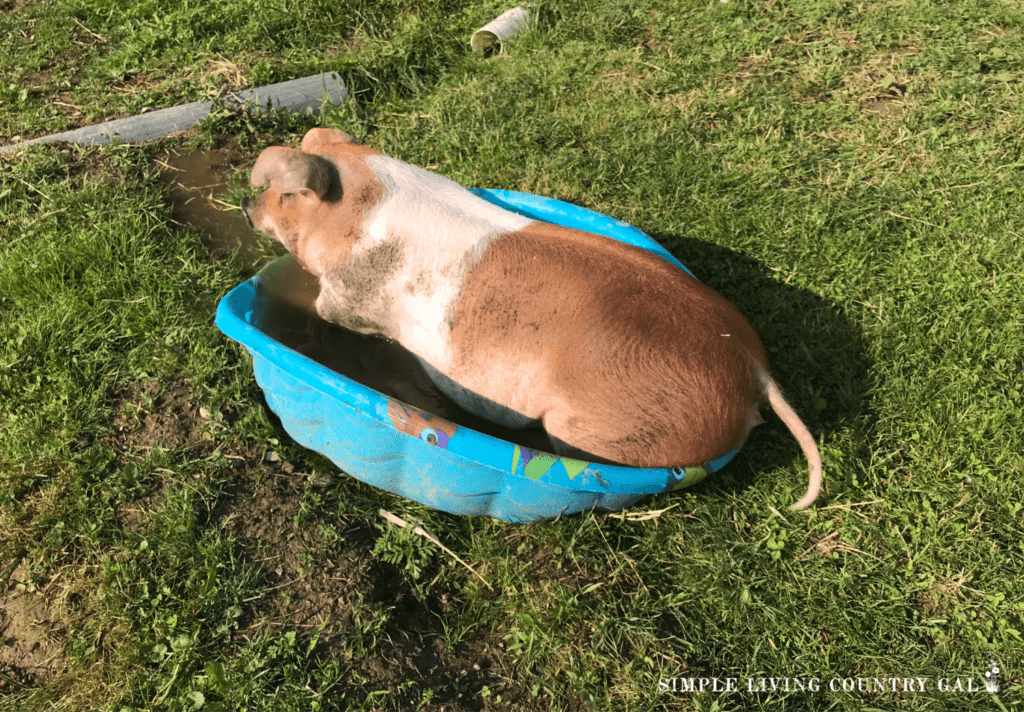
Take Caution: If you hose your pigs down during the heat of the day, always start at the rump and move your way up to their heads. Sudden cold water on a hot pig’s head can cause shock or even death, so please be extra careful.
Finally, cool treats like watermelon, frozen fruits, and veggies are not only yummy but will help to cool down your pigs as well.
How to Keep Chickens Cool
Just like pigs, chickens also cannot sweat. Panting or fanning out their feathers helps to release some of that heat. It is important to make sure your hens have a shady area available.
If you don’t have a tree over your run, a tarp can work just as well. Your goal is to give space for your animals to get out of the direct sunshine while allowing good airflow.
More Chicken Care Resources:
As with all animals, water is the key to keeping cool. For my chickens, I like to have more than one source of water. Rubber feed bowls like the one in the picture below are perfect for this.
They are super durable, will not tip if your chickens decide to use the side to perch on, and are easy to clean out and refill at chore time. There is water inside the coop, one inside of their run, and another outside under a shade tree if they are free-ranging that day.
The rule of thumb here is you can never have too much water out for your chickens. Chickens are forgetful, especially when scratching for bugs and worms. If the water is out of sight, they will not go looking for it. For this reason, I like to have several options always close by for my hens.
A great treat for chickens is frozen fruit and veggies, especially in the afternoon when things are really cooking. This is an excellent way to get rid of those watermelon rinds, apple peels, or leftover vegetables from last night’s dinner.
You can make frozen treats by filling a small container with your veggie or fruit of choice, covering it with water, and freezing it. Once solid, you can store them in a freezer bag and use them when you need something extra to cool your chickens off.
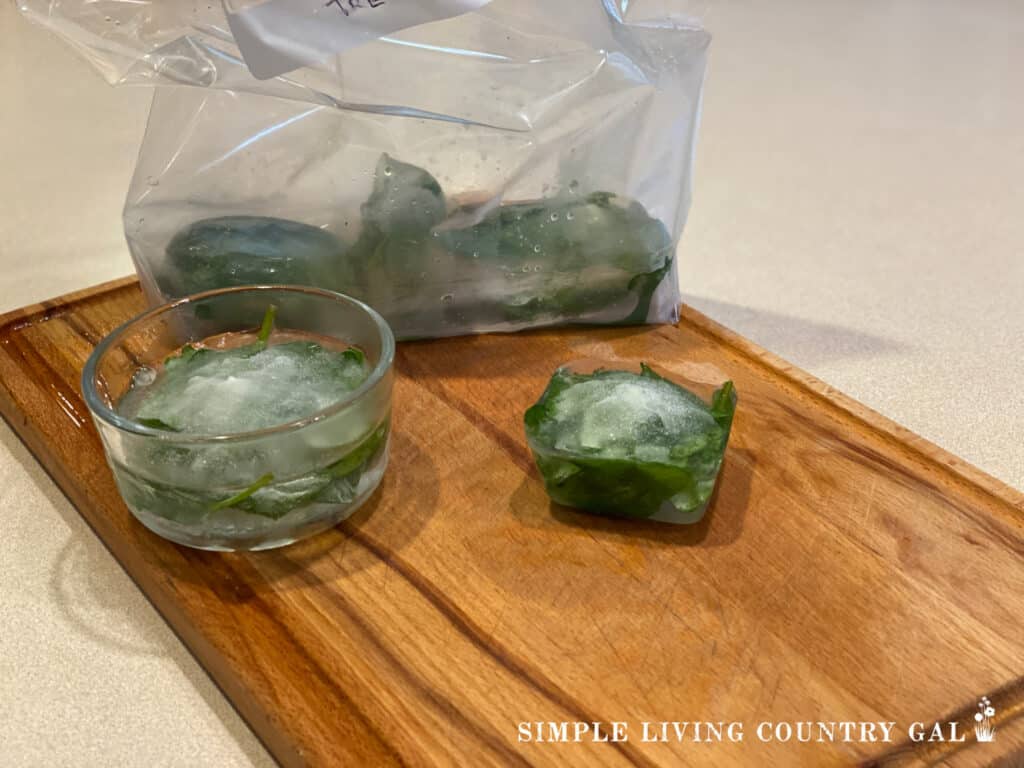
Have a few bags of frozen treats in your freezer so you always have something ready to give to your chickens on a warm afternoon. It really does a great job cooling your chickens off and also gives them something to do, decreasing boredom in your flock.
Boredom can cause hen-pecking and is something you will want to deter whenever you can.
Since your hens will spend quite a bit of time inside the coop, you will want to make sure you have good ventilation and airflow. Stagnant air is bad any time of the year, so clean your vents and keep windows and doors free from debris.
If you are unsure if your coop has an air vent, look up. Most vents are near the top of a sheep or outbuilding. If you do not see one, you can either add one or install a window.
The goal is to create air flow to keep the inside from getting dusty and stale, which can cause issues in chickens.
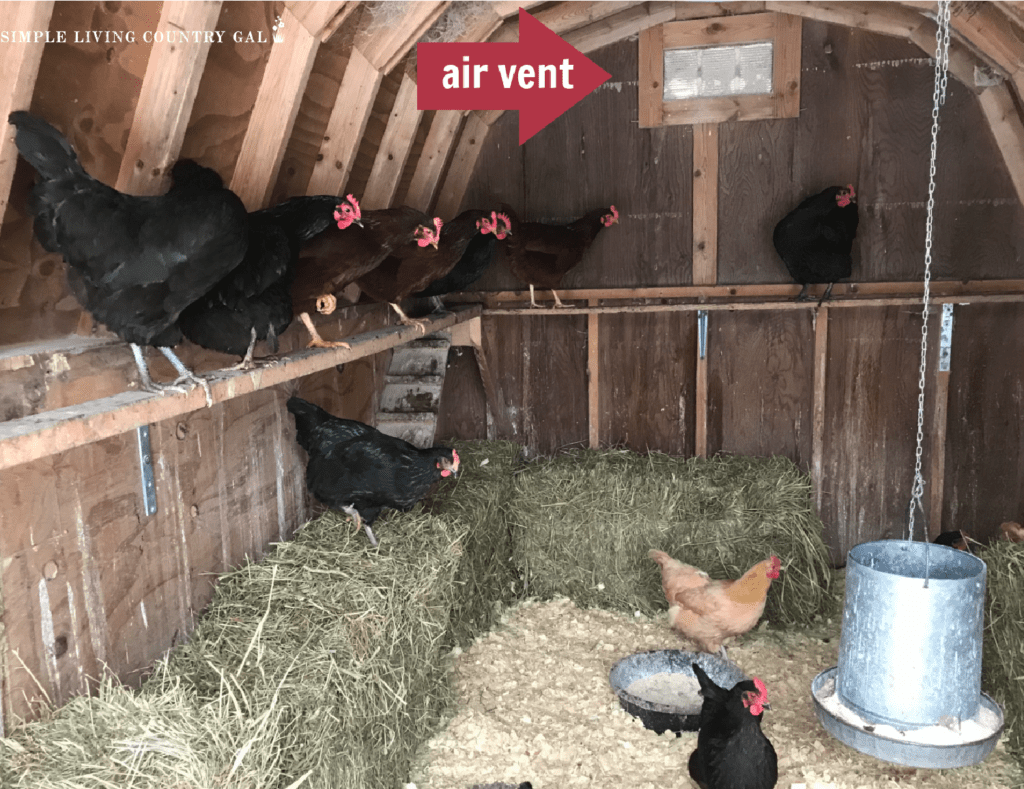
How to Keep Ducks Cool
Ducks are a lot like chickens, so much so that we house and raise ours altogether from baby chicks and ducklings all the way to full-grown. The main difference between chickens and ducks is that ducks love to be in the water and will gladly spend their days there. Because of this, they are usually cool, even on the hottest days.
If you don’t have a pond, no worries. A small pool will work just fine for a couple of ducks. Just be sure to keep it in an area free from direct sunlight. This can be either under a tree or in a corner of a pen with a tarp giving just enough shade to keep the water cool.
Even though the pool is meant for swimming, you will still need to pay attention to its condition. This means changing out the water so it doesn’t get too filthy (ducks are far from neat). Finally, be sure to keep the water in a shaded area so it does not heat up.
Sometime ducks will forget to drink enough water. I found that by putting a few leaves of spinach in a water dish, they will go after them getting a drink at the same time. Ducks, like most animals, are super curious, so when you can use that curiosity in your favor, that’s a plus.
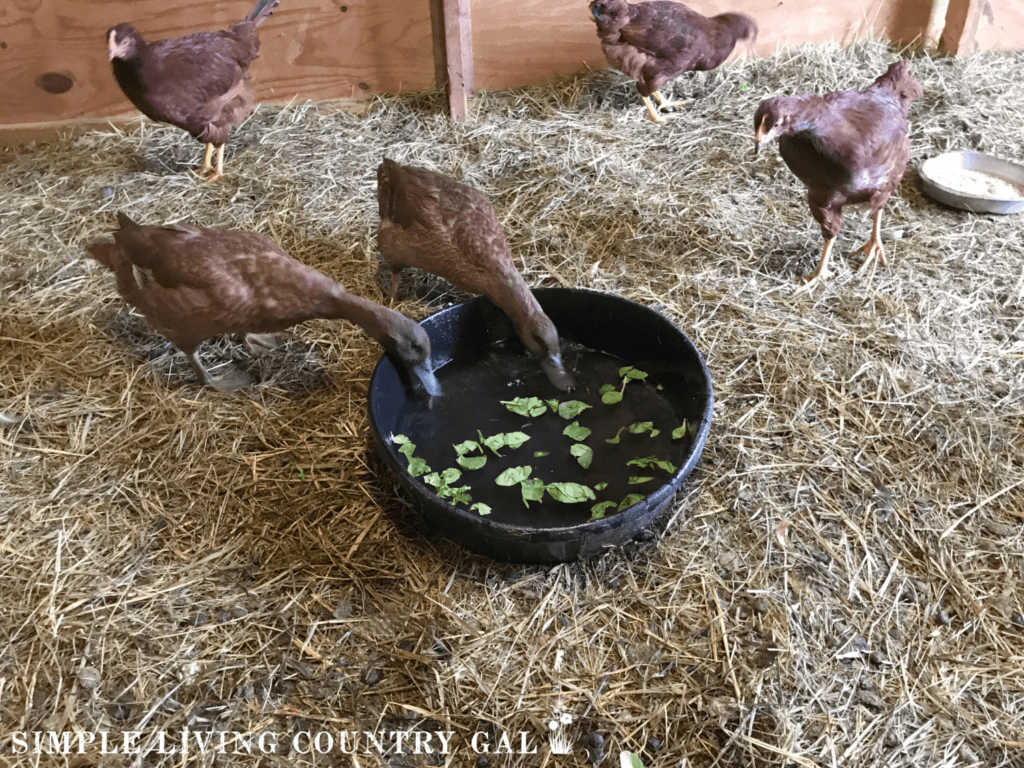
How to Keep Goats Cool
Luckily goats are all able to sweat and pant, so they always tend to cope with the heat a bit better than the other animals we have talked about. That said, I still like to take precautions as they do still tend to get pretty hot in the summer.
We like to have good strong fans in the barn to push the hot air through. By suspending fans from the ceilings, you will help with airflow, which is incredibly important in a stuffy barn. Barns can get pretty stinky, and by moving the air, you will help to make an area that is easier to breathe in, making it easier to keep cool.
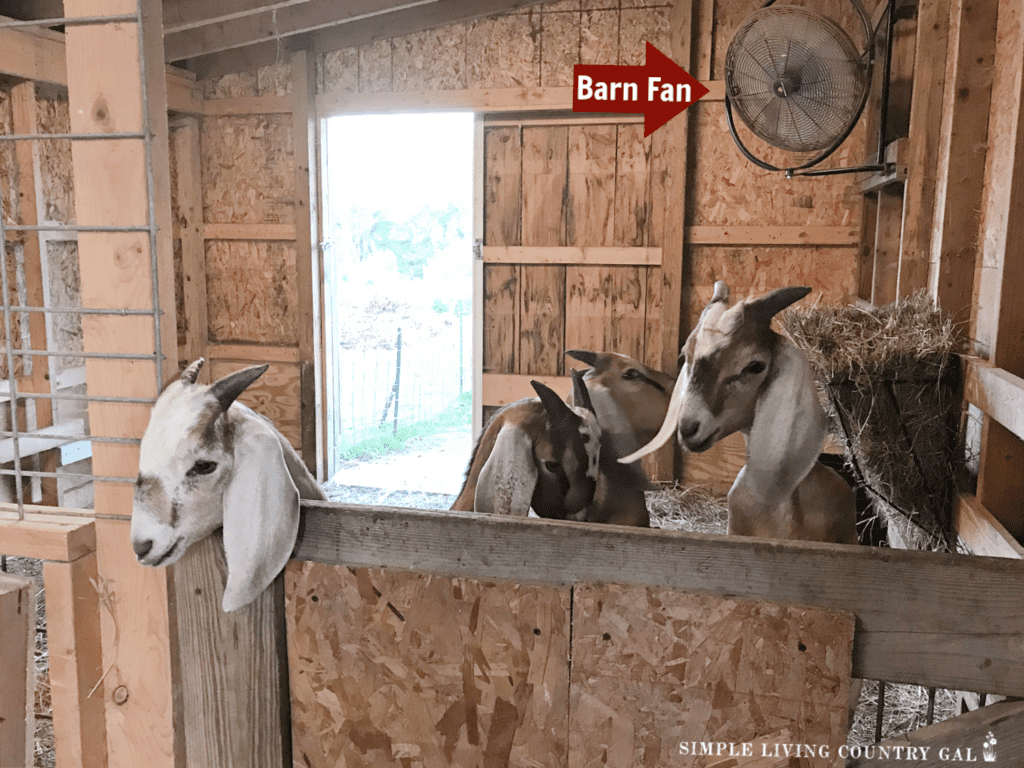
My older wether and breeding buck who are housed outdoors still have a shelter that will get them out of the sun. We also have a nice shade tree that we keep mowed down tight as a reprieve to get to while grazing.
A note of warning here. Goats love to eat the bark off of trees. If you have a favorite near your goats, take the time to put protection around the base to save the bark and your tree. You can use chicken wire staked in with sturdy garden posts to wrap the tree being sure you are out about a foot. This should keep your goats from doing too much damage to the trunk.
Be sure their water is always fresh and cool, going out a few times a day if needed. Goats can be incredibly picky and will not drink water if it is dirty, warm, or stale. For this reason, it is best to change the water out a few times, especially on hot days. You can invest in an automatic waterer, but I have never used one, so I am not sure of the quality.
Changing out water a few times a day may sound like an annoying chore, but if you want healthy goats, it is incredibly important to remember….water, water, water. Keep it fresh and keep it cool.
Again if you graze your animals, you will want to have several water options inside and outside your barn or goat shelter. You can use a rubber bowl inside an old tire to help keep it from getting tipped over.
More Goat Care Resources:
- HOW TO CONVERT A SHED INTO A GOAT BARN
- HOW TO BUILD A FREE DIY GOAT PLAYGROUND
- Encourage Your Goats to Drink More Water
Want to do just a little bit more? Add some ice cubes to the water! Goats love to play, and it’s comical to see them dunking for cubes while drinking.
Finally, with my dairy gals, I like to shave them down at the beginning of summer. Yes, shave them all the way down from head to tail. I do this while they are eating in the milk stand and use my pet clippers (people’s ones are not quite durable enough), leaving the attachment off.
To not stress my goats out too much, I like to do one side at a time. Yes, it takes a few days to get everyone done, but this will do a lot to keep them cool. No one wants a winter coat during the summer, and having all that hair off is something they love. No more fence itching, something goats will do and can damage the fence’s integrity if they do it often enough.
How to keep animals cool in the summer – final tips
Tip #1 Offer Fresh Water Throughout the Day
Change out warm water several times on a very hot day. Yes, I know it takes extra time to change the water out, but this one small step can keep your animals cool and healthy.
Tip #2 Keep Things Clean
At least weekly, wash out your water bowls, jugs, or buckets. You will be amazed at how finicky some animals can be, and simply by washing things out a bit, you will encourage them to drink more.
You know it’s funny, but my goats will rush me when I come out with clean, fresh buckets and drink and drink and drink. Diva’s. 🙂
Tip #3 Watch for Signs of Distress
No one is around your animals as much as you are; if any of them are acting off even in the slightest way, do not delay to investigate.
Heat stress can kill an animal quickly, so be aware of any changes in your animals no matter how subtle. Here are a few things to watch out for.
- Not eating
- Not grazing
- Lethargic
- Not keeping with the herd or the flock
- Acting loopy, walking in circles, or stumbling
Tip #4 Provide a Shaded Area
Make sure your outdoor animals have a shaded area out of the direct sun. You can use a tarp, sheet of plywood or anything that will provide some sort of relief from the hot sun. If you have a tree they can get under, that will usually be enough. As an added step, keep a bowl of water under that tree as well.
Tip #5 Get those Fans Moving
Sometimes it is necessary to call in backup. If you have electricity inside your coop or shelter, you may want to hang a few fans to get the airflow moving.
We used to use box fans but have found that better-quality barn fans do a much better job.
Each spring, we hose the fans down and let them dry in the sun. That is pretty much all the maintenance you need to help them last. You would be amazed at how it helps even when the air is hot and thick.
Remember your animals depend on you for their comfort and safety. By taking a few precautions and learning to read your animals for any changes, you will go a long way to keeping them healthy and happy.
Tip #6. Touch your Animals
Animals are pretty good at masquerading their illnesses or injuries. For that reason, I really like to be as hands-on with them as they will allow. Pet them, hold them, feel them. Sometimes a change in body condition is the only cue you will have of something being wrong. For that reason, I like to hold my chickens, pet my goats, and scratch my pigs.
What tricks have you learned to help keep your animals cool in hot weather? Please share below; I would love to hear from you!
More Homesteading Resources:
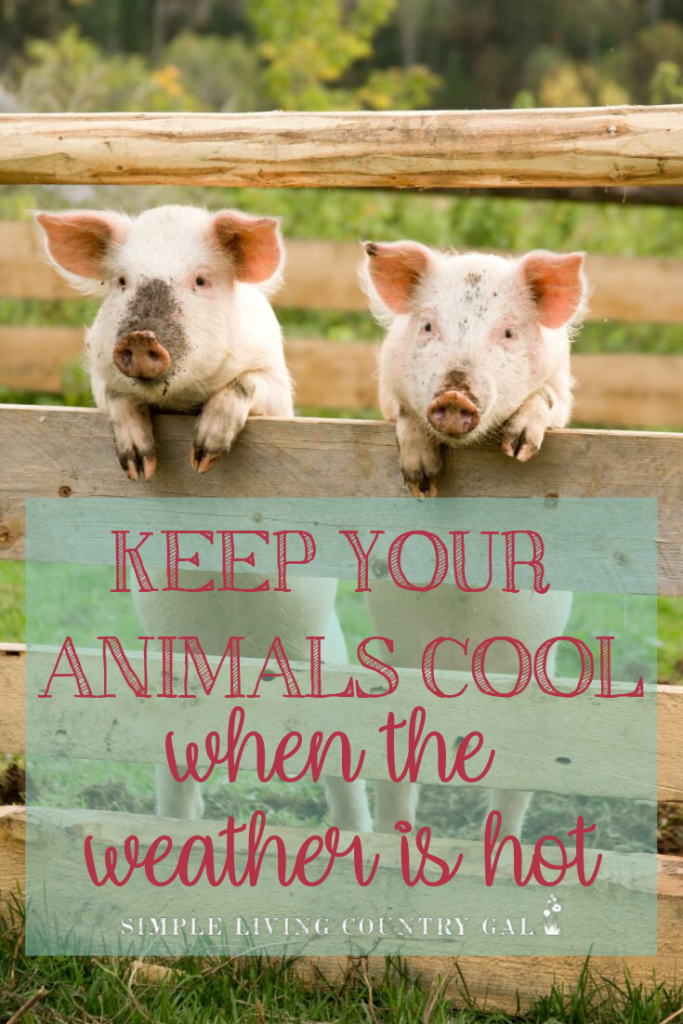

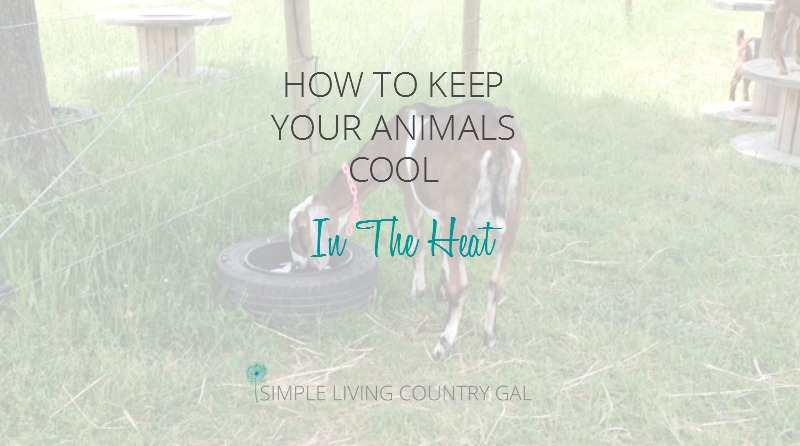
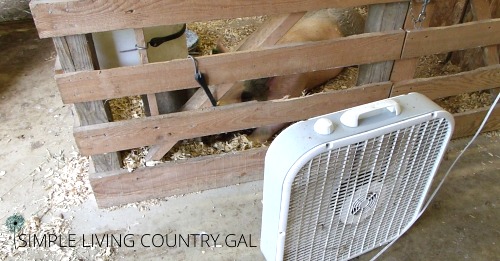
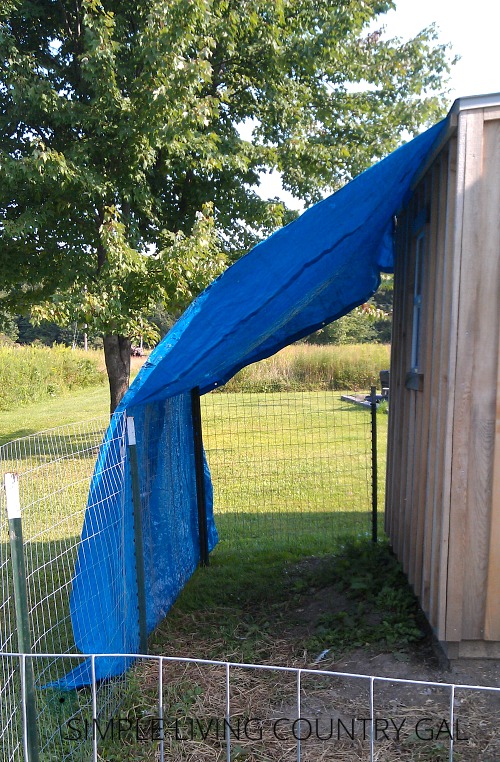
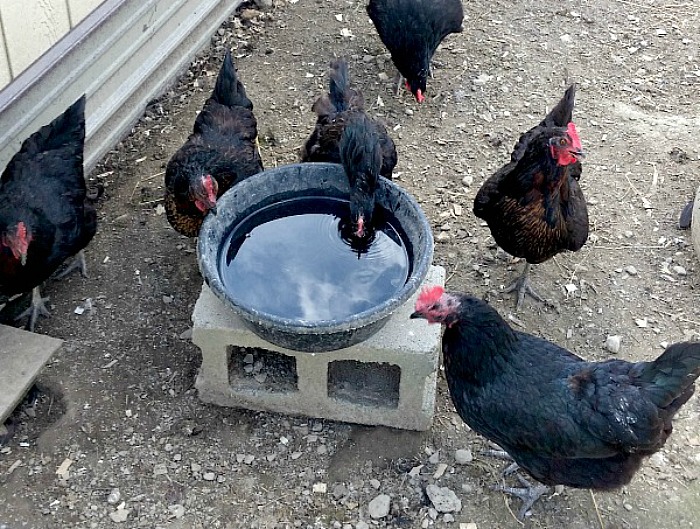
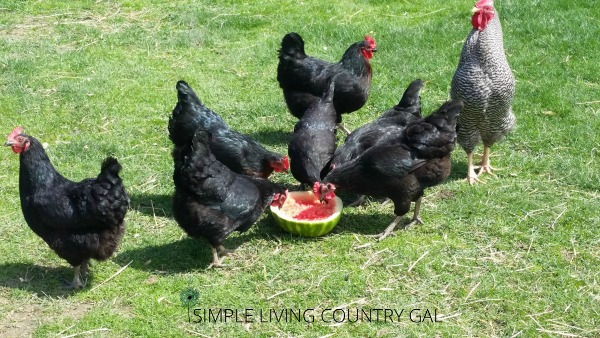
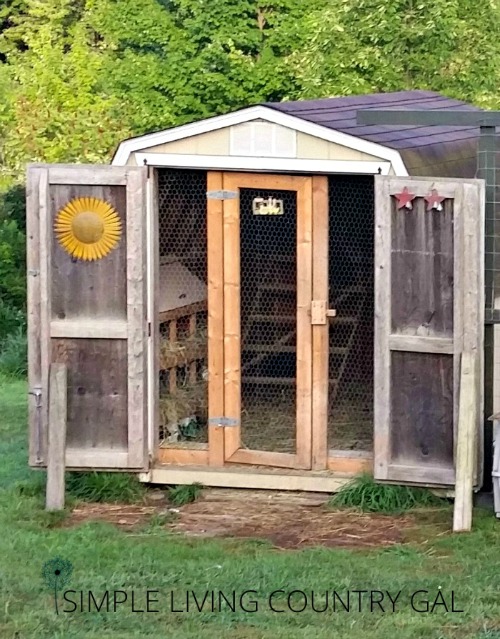
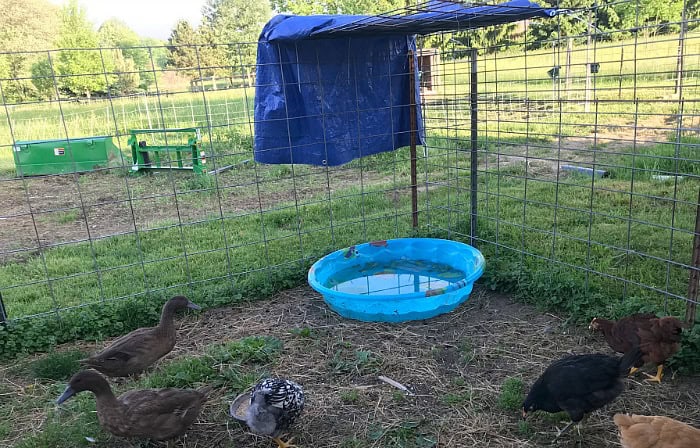
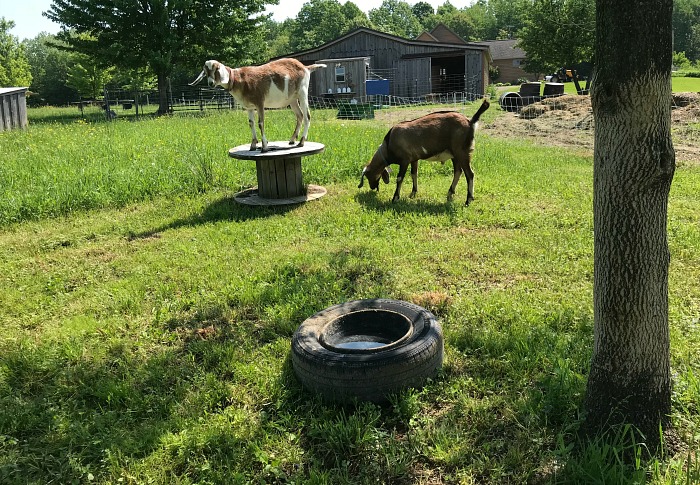
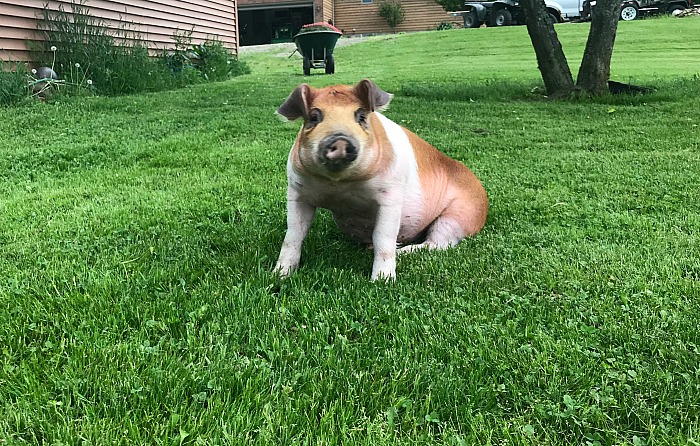
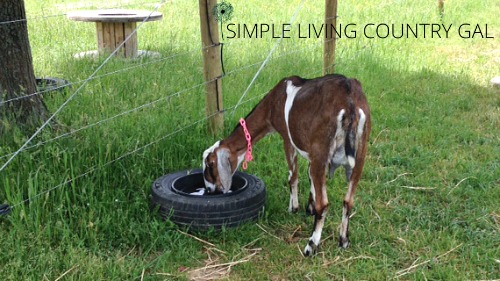

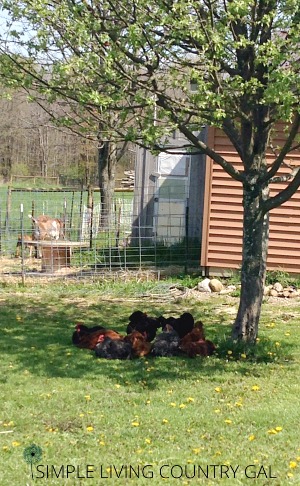
One Comment